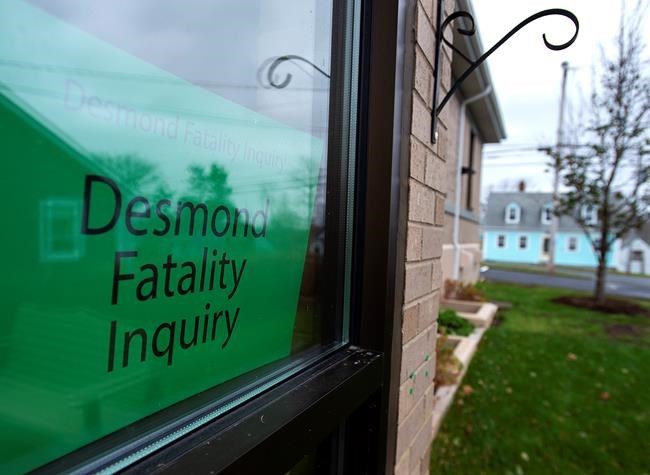
The Desmond Fatality Inquiry is being held at the Guysborough Municipal building in Guysborough, N.S., on Monday, Nov. 18, 2019. THE CANADIAN PRESS/Andrew Vaughan
Republished November 01, 2021 - 12:02 PM
Original Publication Date November 01, 2021 - 10:52 AM
PORT HAWKESBURY, N.S. - An inquiry investigating why a former soldier killed three family members and himself in 2017 heard testimony Monday from a psychiatrist who said Lionel Desmond had an inadequate discharge plan when he left a psychiatric hospital in August 2016.
Dr. Scott Theriault, who works at the East Coast Forensic Hospital in Dartmouth, N.S., was asked by the provincial fatality inquiry to complete a psychological autopsy on the former infantryman from Nova Scotia.
Theriault told the inquiry that Desmond was not psychologically stabilized when he left a residential treatment program at Ste. Anne's Hospital in Montreal, which specializes in treating veterans with post-traumatic stress disorder and other operational stress injuries.
Desmond, a former rifleman with the 2nd Battalion, Royal Canadian Regiment, had served in Afghanistan in 2007 and was diagnosed with PTSD in 2011. He was medically discharged in June 2015 and was in the process of moving from Canadian Forces Base Gagetown in central New Brunswick to rural Nova Scotia when he was sent to the Montreal hospital.
The inquiry has heard Desmond left the program two weeks early. As well, staff at the hospital concluded he had made limited progress.
The specialists said they detected possible cognitive deficiencies that may have interfered with his treatment, and they strongly recommended more testing, including a neuropsychological assessment, which never happened.
Theriault said there was a conference call involving staff at the hospital and Veteran's Affairs, but he said that meeting did not translate into a detailed discharge plan.
"Given that a lot of those discharge planning pieces were left hanging, that would suggest a downward trajectory for him," he said. "In the absence of all those elements being addressed prior to his discharge ... that would increase the probability that Mr. Desmond would not be successful in re-integrating into his community."
The forensic psychiatrist said there should have been a so-called "warm handover" from the New Brunswick team to the Operational Stress Injury Clinic in the Halifax area, but there's no evidence of such a transfer.
"Given the information available at the time, that sort of warm transfer process would have allowed the incoming clinicians who were taking on the case to be more fully informed about the issues they might be expected to deal with," Theriault said.
"Unfortunately, when he leaves Ste. Anne's Hospital, the documentation is slow to follow. There's a case conference, but not really what I would call a warm handoff."
Theriault said when patients are discharged from the forensic hospital where he works, they are given a discharge binder and a risk management protocol that provides instructions on followup treatment and what to do if they encounter a crisis.
In Desmond's case, his followup care was complicated by his decision to move back to Nova Scotia, he said.
"He still wasn't sure where he was going to live, or where he was going to get followup services," the psychiatrist said. "I don't get any sense that he was in the know about who he was going to see."
The inquiry has heard that Desmond was told he could meet with someone at the Operational Stress Injury Clinic in Fredericton once he had left Ste. Anne's, but he declined that offer, saying he wanted to received treatment in Nova Scotia.
"There's no evidence of any scheduled followup appointment," Theriault said.
Though staff at Ste. Anne's Hospital had produced a long list of recommendations to help the deeply troubled veteran, multiple witnesses have testified that Desmond received no actual therapeutic treatment in the four months before the killings, mainly because of bureaucratic delays and barriers.
By December 2016, only two of the recommendations from Ste. Anne's — the need for psychotherapy and a clinical care manager — were starting to be addressed.
On Jan. 3, 2017, Desmond legally purchased a Soviet-era SKS 7.62 semi-automatic rifle, changed into camouflage clothing and fatally shot his 31-year-old wife, their 10-year-old daughter Aaliyah and his 52-year-old mother Brenda inside the family's home in Upper Big Tracadie, N.S.
The inquiry started hearings in January 2020. It is expected to wrap up before the end of this year.
This report by The Canadian Press was first published Nov. 1, 2021.
— By Michael MacDonald in Halifax
News from © The Canadian Press, 2021